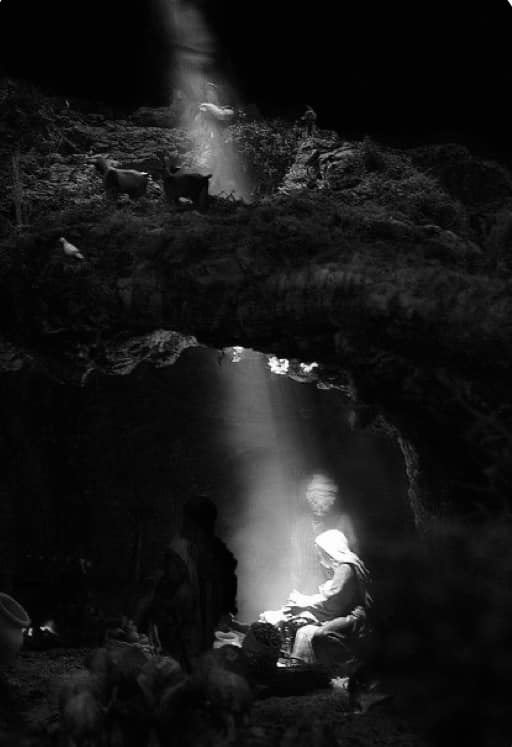7,837 total views

“Oh little town of Bethlehem …” so goes the song. Jesus was born in the little town of Bethlehem, בֵּֽית־לֶ֣חֶם, Beyt-lechem, (cf. Lk 2:4; Mt 2:5-6). It is but fitting that the Messiah should be born in the city from which King David hails, (1Sam 16:1;17:12), and the place of his annointment as king (16:4-13). Earlier the town figures prominently in the story of Ruth, the great grandmother of David. The birth of Jesus took place in Bethlehem in fulfillment of a prophecy of Micah: “But you, Bethlehem-Ephrathah least among the clans if Judah, from you shall come forth for me one who is to be ruler in Israel; whose origin is from of old, from ancient times.” (5:1; cf John 7:42).
The Davidic lineage of Jesus, the Messiah and Savior King, is further affirmed when the first family moved to the tiny village of Nazareth where Jesus spent most of his childhood, (Mt:2:23, 13:54; Lk 2:4, 4:16), a place quite insignificant that it was not mentioned in the Old Testament, (thus, not surprisingly, his origins are held up to scorn by those skeptical of his mission cf.John 1:46). But the name Nazareth, נצרת, contains the root netzer (נצר), meaning “branch”, alluding to the messianic prophecy about the future Davidic king: “A shoot will come up from the stump of Jesse; from his roots, a Branch will bear fruit” (Isaiah 11:1).]
Going back to “Beyt-lechem”, the name means “house of bread”. Years later, Jesus multiplied loaves of bread on several ocassions to feed thousands of people, (attested to by all the gospels, e.g. Mark 6:44) and declared “I am the bread of life; whoever comes to me will neve hunger and whoever believes in me will never thirst” (John 6:35). Taking up this motiff, one could connect it to the circumstance sorrounding his birth, that he “was laid in a manger because there was no room for them in the inn” (Lk 2:7,12). It could be an allussion to the accusation of Prophet Isaiah against the people of Israel who failed to recognize and respond to God’s plan: “an ox knows its owner, an ass its master’s manger; but Israel does not know, my people has not understood” (Is 1:3). Christ, indeed, “came to what was his own, but his own people did not accept him” (John 1:11).
Jesus was born in Bethlehem, in a manger. He is the bread that comes down from heaven, the food that gives eternal life. As we celebrate his coming may we all be truly nourished by providing him ‘a room in the inn’ of our hearts, not only on Christmas but everyday, whenever we receive him spiritually or sacramentally in the Holy Eucharist. The Eucharist is the Bethlehem alive.
The Word
Isaiah’s announcement of salvation in the restoration of Zion and the comforting of God’s people was, in the words of the letter to the Hebrews, fragmentary and partial, (cf readings during the day of Christmas: Is 52:7-10; Heb 1:1-6). The way in which human redemption was ultimately realized was truly God’s “last word”, definitive and non-repeatable, where John in his prologue traced it back forcefully to the eternal presence of Christ with the Father identifying the Word clearly with God, from the dawn of creation, (John 1:1-5), to the Word’s self-presentation in the world, (v10f) and finally the Incarnation, definitely referring to the pre-existent Word’s appearance in human form, (v14f).
The word “ logos “ (λόγος) in the NT,
(”dabar” in OT), ordinarily refers both to human utterances and that of God, in the basic sense of the ‘word(s), or saying, even speech’. When attributed to the Lord, it constitutes a technical expression of divine revelation. In the OT it is revealed to the patriarchs, (Gen 15:1; to Joshua, (8:27), and commonly to the prophets. It is also found in the law of Moses in the context of binding instructions, (Num 3:16; 15:31). In NT, the “words”, whether referring to the disciples or most specifically to Jesus, are indicated in the context of preaching and teaching, (Mt 7:24f; Mk 10:24; Lk 4:32f; John 2:22). But in particular, the person of Christ, identified as “the Word”, is equated with God the divine being, (John 1:1, 14; 1 John 1:1; Rev 19:13), the revealer par excellence of the Father.
What John has in his prologue may not be a “historical presentation” of facts as Matthew and Luke narrated it but it was a warm and engaging presentation in the symbolic form of what Jesus meant. Taken together Jesus’ birth presents some interesting questions: what are the historical circumstances, the when, etc; the answer to all these is “very little”. But it does not really matter. The readings are at one in proclaiming salvation. Sin is vanquished and God has come among us in human form. They relate the basic idea. The Son of God comes as man, born in simple circumstances to save us and bring us home. That is Christmas.
Before this mystery, we reflect in awe and wonder:
“Heaven cannot contain Him,
Nor the bounds of earth,
Yet, oh glorious mystery!
Virgin gives him birth.
Now the light ariseth,
In the darkened skies.
Now the proud are humbled,
and the lowly rise.
Unto God be glory,
Peace to men be given;
This His will who dwelleth
In the heights of heaven.”
Amen.
(St. John Damascene)
And we pray ardently that the peace brought by our Savior becomes a reality throughout the world (in Ukraine, etc.), especially in the land of His birth where raging war continues between Israel and Hamas. “Peace to people of good will”.
Amen.














